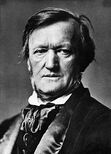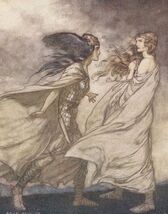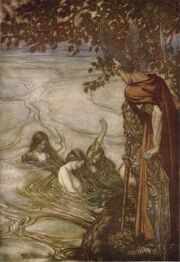
Richar Wagner
Götterdämmerung (Twilight of the Gods) is the last opera in Richard Wagner's Der Ring des Nibelungen (The Ring of the Nibelung) cycle of four operas. Götterdämmerung is translated into German from the Old Norse phrase Ragnarök, the war of the gods and the apocalypse. Götterdämmerung can also be used to English to describe a catastrophic end to a situation.
Prologue[]
· The Norns weave the rope of Fate and sees the death of the Norse gods, when Odin burns Valhalla signaling the end of the gods, or Ragnarok. The rope breaks suddenly, the Norns mourn for their loss of wisdom and disappear. Lovers Siegfried and Brünnhilde emerge from a cave, and Siegfried wants to go on other adventures. He gives Brünnhilde the Ring of power that can turn objects into gold, as a token of his faith. Siegfried’s ride towards the Rhine River.
Act 1[]
· Gunther, lord of the Gibichungs, was advised by his half brother Hagen to find a wife for himself, Brünnhilde,

Brünnhilde is visited by her Valkyrie sister Waltraute. By Arthur Rackham (1912)
and a husband for his sister, Gutrune, Siegfried. Gultrune was told that if she gives Siegfried a love potion, he would forget Brünnhilde, and Brünnhilde would be available for Gunther. Hagen’s true purpose was to obtain the Ring of power.
· Siegfried meets Gunther, and Gultrune treated him with the love potion. Siegfried fell in love with Gultrune and offer to win Gunther a bride, Brünnhilde, and journey to Brünnhilde’s rock. Brünnhilde visited her Valkyrie sister, who told her that Odin had return from his journeys with his Gungnir Spear, source of his power, shattered. He is dismay and is now wing for the end of the gods. The sister advised Brünnhilde to give back the Ring to the Rhinemaidens, because the Ring’s curse is affecting Odin, their father. Brünnhilde does not want to give up Siegfried’s token of love. Siegfried arrived disguised as Gunther and violently claim she is his wife and obtain the Ring.
Act 2[]
· Hagen is advised by his father Alberich to kill Siegfried and get the Ring. Gunther, Siegfried (now in his original form), and Brünnhilde arrived in time for Gunther and Brünnhilde’s wedding. Seeing the Ring on Siegfried, Brünnhilde understood that it was Siegfried who conquered her and is angered at his betrayal. He sears on Hagen’s spear that the accusation is untrue. However, if the oath to the spear is proven false, Hagen can kill Siegfried. Gunther was ashamed by Brünnhilde’s outburst, but agree with Hagen to slay Siegfried. Gunther and Brünnhilde vow to kill Siegfried, while Hagen wants to own the Ring and rule the realm.

The Rhinemaidens warn Siegfried by Arthur Rackham (1912)
Act 3[]
· Siegfried, Gunther, and Hagen went hunting near the Rhine. The Rhinemaidens mourn the lost of the Rhine gold and Urge him to return the Ring, but he scoffs them off. They predicted his death, but sees that Brünnhilde will be kinder and will return the Ring. Hagen gave him a potion to make him remember Brünnhilde. Hagen stabs him in the back, justifying his killing. At the funeral, Gunther challenged Hagen’s right for the Ring and Hagen killed him. He tried to take the ring, but Siegfried’s dead fingers threaten him. Brünnhilde realizes that Siegfried was not responsible for violently conquering her and forgives him. She issues order for a large funeral pyre for Siegfried by the Rhine. She takes the Ring and told the Rhinemaidens to retrieve it from her ashes. She rode her horse into the pyre and dies. The Hall of Gibichungs burns. The Rhine overflows to quench the fire and retrieve the Ring. Hagen tried to stop the Rhinemaidens but was dragged down and drowned. The Hall of Valhalla burns, and the gods were consumed by fire.
Götterdämmerung in The Waste Land[]
Line 267-269
"The river sweats
Oil and tar
The barges drift."
This part could be an allusion to the funeral pyre built for Siegfried on the Rhine or the pollution of the Thames
Line 277-278
Line 290-291 "Weialala leia
Wallala leialala"
This is the cry of the Rhinemaidens, singing their sad song of their lost gold. However the Lost gold here can be interpret as a lament for the loss of their innocence.
Line 293- 299
"Highbury bore me, Richmond and Kew
Undid me. By Richmond I raised my knees
Supine on the floor of a narrow canoe."
...
"He wept. He promised 'a new start.
"I made no comment. What should I resent?"
Here a Rhine maiden recalls her birth in Highbury and lost her innocence in Richmond and Kew. She bitterly recalls the man who made the 'new start.'